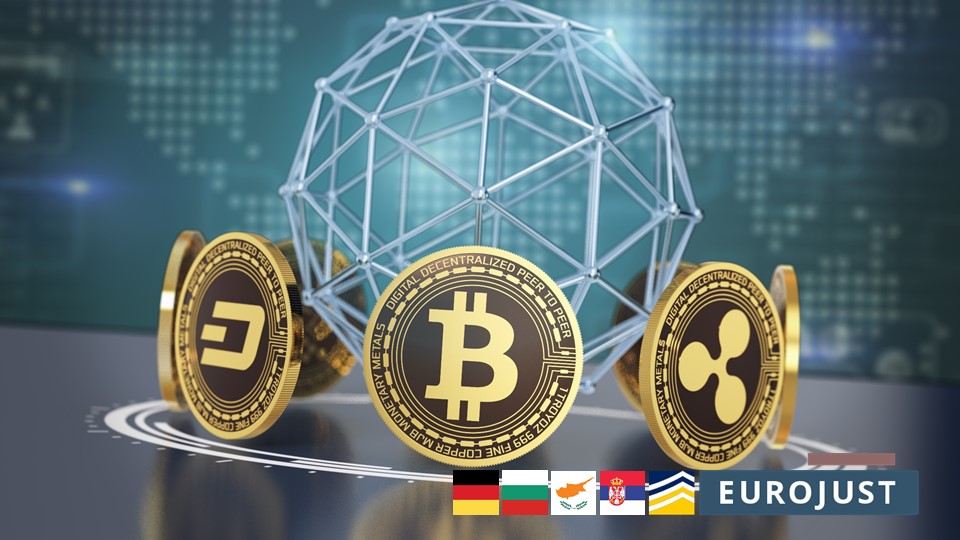A cross-border European task force has taken down a cryptocurrency fraud network that had been using Cyprus as the base for laundering the illegal proceedings.
Coordinated action by the EU agency for criminal justice cooperation Eurojust, law enforcement agents from Europol and at least 33 German police officers headed the investigation, as most of the victims were from Germany.
The crypto fraud network operating from Bulgaria, Cyprus and Serbia, set up bogus call centres, which defrauded numerous victims in Germany, Switzerland, Austria, Australia and Canada for “at least tens of millions of euros”, Eurojust said in an announcement.
A Eurojust press spokesperson told the Financial Mirror that the names of the fraud call centres are not revealed, as a matter of the agency’s policy. Anyone wishing to find out or to report if they were victims, “should contact their national police service.”
A Cyprus Police official did not disclose the name of the call centres and said that, “investigations were carried out at two locations in Cyprus, without coming up with anything.”
Sources close to the investigations told the Financial Mirror that the two locations were in Limassol and Paphos, where the vast majority of forex, crypto and investment cold-calling call centres are based.
Eurojust said that four call centres and 18 locations were searched, and over 250 workplaces were identified in Serbia, Bulgaria, Cyprus and Germany. Fourteen persons were arrested in Serbia and one in Germany.
It added that more than 250 persons were interviewed and over 150 computers, various electronic equipment and data back-ups, three cars, two luxury apartments and 1 mln US dollars in cryptocurrencies and EUR 50,000 in cash were seized.
“The number of victims identified are almost certainly only the tip of the iceberg,” the Eurojust statement added.
During investigations into the organised crime group which ran the fraudulent scheme, high volumes of financial transactions were detected. The group operated the call centres from Serbia and used a technological infrastructure in Bulgaria to run the scheme.
Victims lured by phone
The network attracted potential investors online and often contacted victims by phone to lure them into doing small investments, speaking English and German.
“After initial gains, victims invested more money, which they subsequently lost. During the operation, active call centres were searched and closed by the authorities in Serbia,” Eurojust said.
The European judicial agency said it organised a coordination centre with Germany, Bulgaria, Cyprus and Serbia to support the cross-border cooperation, including the presence of a crypto expert from Germany and Europol EC3.
Investigations into the online scam were launched in 2021 by the German Public Prosecutor’s Office (PPO) in Stuttgart and the State Office of Criminal Investigations of Baden-Württemberg.
Assisting the task force in Cyprus was the Office for Executing European Investigation Orders of the Police Crime Combating Department.
Arrests on Wednesday
According to Europol, there were 15 arrests on Wednesday, 14 in Serbia and one in Germany. In all, 261 individuals were questioned, (42 in Bulgaria, 2 in Cyprus, 3 in Germany and 214 in Serbia), some of whom are still awaiting prosecution.
A total of 22 locations were searched, of which five in Bulgaria, two in Cyprus and 15 in Serbia. These included four call centres and 11 residences in Serbia, two residences in Cyprus, two companies and three residences in Bulgaria.
Europol said the suspects used advertisements on social networks to lure victims to websites covertly operated by the criminals.
“The victims, mainly from Germany, would first invest low, three-digit sums (in cryptocurrencies). Fake price hikes leading to supposedly lucrative profits for investors then persuaded them to make transfers of higher amounts.
“The investigation suggests that the number of unreported cases is likely to be much higher. This would mean that the illegal gains generated by the criminal groups, with at least four call centres in eastern Europe, may be in the hundreds of millions of euros.”










